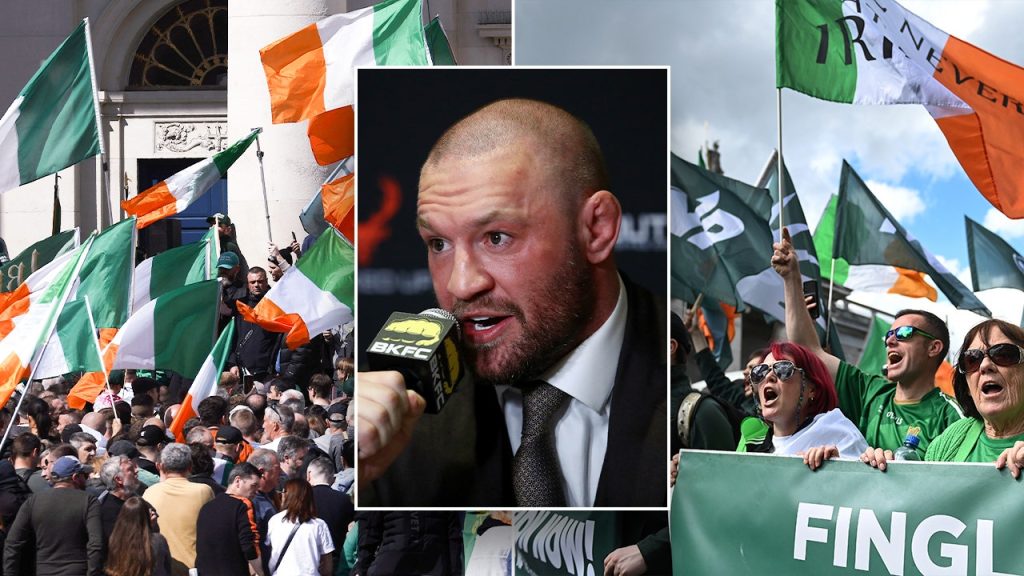On Saturday, April 26, 2025, a significant march took place in Dublin, organized by thousands of citizens protesting against the government’s mass migration policies. The demonstration, attended by notable figures such as UFC champion Conor McGregor, aimed to highlight perceived failures in the current administration. McGregor, who is contemplating a presidential run, emphasized unity and respect among protestors while calling for a political movement to prioritize Irish citizens. The event drew considerable media attention as it underscored ongoing debates about immigration and national identity in Ireland.
| Article Subheadings |
|---|
| 1) Background of the Protest |
| 2) Conor McGregor’s Role |
| 3) The March Details |
| 4) Response to the Protest |
| 5) Future Implications |
Background of the Protest
In recent years, Ireland has seen a significant influx of migrants, leading to heightened public discourse about national identity and citizenship. Many citizens feel that local resources are strained, prompting concerns about immigration policies and their impact on Irish society. This protest arose from frustrations related to the perceived inadequacies of government policies towards migration, with participants arguing for prioritizing the needs of Irish citizens. Events in the broader European context, such as the refugee crisis and its social repercussions, also play a vital role in shaping these sentiments, reflecting a growing nationalist movement within the country.
Conor McGregor’s Role
A prominent figure in this demonstration, Conor McGregor has leveraged his celebrity status to draw attention to political issues in Ireland. In a video address from Dublin’s Garden of Remembrance, McGregor resonated with the crowd by recalling Ireland’s fight for independence and stressing the need for unity rather than division. His involvement has sparked discussions about his potential presidential candidacy, particularly after a recent meeting with former President Donald Trump, which underscored his ambitions in the political arena. McGregor’s passion for his country and its citizens has made him a rallying figure for those disillusioned with current government policies.
The March Details
The rally officially commenced on Saturday afternoon with thousands of participants, many waving tri-color flags, as they walked down O’Connell Street. Protestors displayed a variety of placards with slogans such as “Irish Lives Matter” and “Ireland is Full,” invoking strong nationalistic sentiments. Additional signs, including “Make Ireland Great Again,” further indicated the political undertones of the gathering. Security was evident, with Irish police, or gardaí, maintaining a careful distance between the main protest group and counter-protesters who opposed the demonstration. This contrast highlighted the divided opinions in Irish society regarding migration and national policies.
Response to the Protest
In the wake of the march, officials reported no significant public order incidents, although a few arrests were made for related offenses. The event remained peaceful, showcasing the protestors’ organized efforts to convey their message effectively. However, the counter-protest organized by groups like United Against Racism indicated a broader societal rift; their banners carried messages such as “Dublin Stands Against Racism,” which highlighted opposition to nationalistic rhetoric. The Prime Minister, Micheál Martin, expressed disapproval of the sentiments expressed during the march, emphasizing his government’s commitment to addressing social issues such as housing while urging focus on constructive dialogue.
Future Implications
The implications of this protest extend beyond immediate grievances about migration policies. As Conor McGregor suggests, this political awakening among citizens could influence future elections and political discourse in Ireland. With McGregor’s potential presidential ambitions, the political landscape may shift as more prominent figures seek to align with or counter the rising nationalist sentiments. The growing support for political movements emphasizing Irish identity signals a pivotal moment in Ireland’s socio-political evolution, presenting challenges and opportunities for the current government to adapt to the changing needs and perspectives of its citizens.
| No. | Key Points |
|---|---|
| 1 | Mass protest against government migration policies in Dublin. |
| 2 | Conor McGregor plays a central role, highlighting nationalism. |
| 3 | Rally remained peaceful with strong police presence and counter-protests. |
| 4 | Political responses underline division in societal views on immigration. |
| 5 | Future of Irish politics may be reshaped by emerging nationalist sentiments. |
Summary
The Dublin march against mass migration policies marks a crucial moment in contemporary Irish politics, reflecting deeper societal divisions regarding immigration. With public figures like Conor McGregor advocating for change and unity among citizens, the discourse surrounding national identity and governmental responsibility is set to evolve. As the nation grapples with these challenges, the outcomes of such protests will play a significant role in shaping Ireland’s political landscape moving forward.
Frequently Asked Questions
Question: What were the primary concerns raised during the protest?
The protestors raised concerns about government policies that they feel prioritize migrant needs over those of Irish citizens, expressing frustration over resource allocation and national identity.
Question: Who spoke at the march besides Conor McGregor?
Dublin City councilors including Gavin Pepper, Philip Sutcliffe, and Malachy Steenson were among those who addressed the crowd, voicing support for the movement.
Question: What was the government’s response to the protest?
Prime Minister Micheál Martin criticized the negative sentiments expressed at the march, urging focus on the opportunities available in modern Ireland and advocating for constructive dialogue regarding social issues.


